Related Research Articles

Jefferson Finis Davis was an American politician who served as the president of the Confederate States from 1861 to 1865. As a member of the Democratic Party, he represented Mississippi in the United States Senate and the House of Representatives before the American Civil War. He previously served as the United States Secretary of War from 1853 to 1857 under President Franklin Pierce.
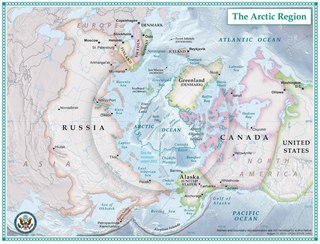
The Arctic is a polar region located at the northernmost part of Earth. The Arctic consists of the Arctic Ocean, adjacent seas, and parts of Alaska, Canada, Finland, Greenland (Denmark), Iceland, Norway, Russia, and Sweden. Land within the Arctic region has seasonally varying snow and ice cover, with predominantly treeless permafrost containing tundra. Arctic seas contain seasonal sea ice in many places.

Culpeper is the only incorporated town in Culpeper County, Virginia, United States. The population was 20,062 at the 2020 census, up from 16,379 at the 2010 census. It is the county seat of Culpeper County.

John William Davis was an American politician, diplomat and lawyer. He served under President Woodrow Wilson as the Solicitor General of the United States and the United States Ambassador to the United Kingdom. He was the Democratic nominee for president in 1924 but lost to Republican incumbent Calvin Coolidge.
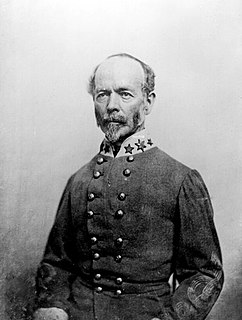
Joseph Eggleston Johnston was an American career army officer, serving with distinction in the United States Army during the Mexican–American War (1846–1848) and the Seminole Wars. After Virginia seceded from the Union, he entered the Confederate States Army as one of its most senior general officers.

Patrick J. ("Pat") Michaels is an American former agricultural climatologist. Michaels was a senior fellow in environmental studies at the Cato Institute until Spring 2019. Until 2007, he was research professor of environmental sciences at the University of Virginia, where he had worked from 1980.

Michael Evan Mann is an American climatologist and geophysicist. He is the director of the Earth System Science Center at Pennsylvania State University. Mann has contributed to the scientific understanding of historic climate change based on the temperature record of the past thousand years. He has pioneered techniques to find patterns in past climate change and to isolate climate signals from noisy data.

A nor'easter, or an East Coast low is a synoptic-scale extratropical cyclone in the western North Atlantic Ocean. The name derives from the direction of the winds that blow from the northeast. The original use of the term in North America is associated with storms that impact the upper north Atlantic coast of the United States and the Atlantic Provinces of Canada.

John Clifford Pemberton was a career United States Army officer who fought in the Seminole Wars and with distinction during the Mexican–American War. He resigned his commission to serve as a Confederate Lieutenant-General during the American Civil War. He led the Army of Mississippi from December 1862 to July 1863 and was the commanding officer during the Confederate surrender at the Siege of Vicksburg.
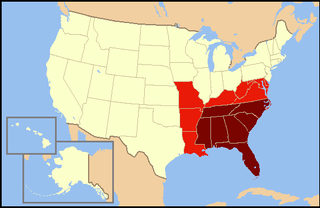
The southeastern United States, also referred to as the American Southeast or simply the Southeast, is broadly the eastern portion of the southern United States and the southern portion of the eastern United States. It comprises at least a core of states on the lower East Coast of the United States and eastern Gulf Coast. Expansively, it includes everything south of the Mason–Dixon line, the Ohio River, the 36°30' parallel, and stretches as far west as Arkansas and Louisiana. There is no official U.S. government definition of the region, though various agencies and departments use different definitions.
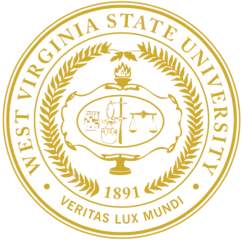
West Virginia State University (WVSU) is a public historically black, land-grant university in Institute, West Virginia. Founded in 1891 as the West Virginia Colored Institute, it is one of the original 19 land-grant colleges and universities established by the second Morrill Act of 1890, which evolved as a diverse and inclusive campus. Following desegregation, WVSU's student population slowly became more white than black. As of 2017, WVSU's student body was 75% white and only 8% African-American.

Westmoreland "Morley" Davis was an American lawyer, politician, and the 48th Governor of Virginia, serving from February 1, 1918 to February 1, 1922.

Lonnie Thompson, is an American paleoclimatologist and Distinguished University Professor in the School of Earth Sciences at The Ohio State University. He has achieved global recognition for his drilling and analysis of ice cores from ice caps and mountain glaciers in the tropical and sub-tropical regions of the world. He and his wife, Ellen Mosley-Thompson, run the ice core paleoclimatology research group at the Byrd Polar Research Center.
The Romney Expedition was a military expedition of the Confederate States Army during the early part of the American Civil War. It is named for Romney, West Virginia, which at the time was still in the state of Virginia. The expedition was conducted in this locale from January 1 to January 24, 1862, as part of the preliminary actions of Stonewall Jackson's Valley Campaign. Confederate forces under Major General Thomas J. "Stonewall" Jackson cleared Union forces under Major General Nathaniel Banks and Brigadier General William S. Rosecrans from the lower Shenandoah Valley and surrounding Allegheny ranges, and then successfully severed the Baltimore and Ohio Railroad and the Chesapeake and Ohio Canal.

In phenology, season creep refers to observed changes in the timing of the seasons, such as earlier indications of spring widely observed in temperate areas across the Northern Hemisphere. Phenological records analyzed by climate scientists have shown significant temporal trends in the observed time of seasonal events, from the end of the 20th century and continuing into the 21st century. In Europe, season creep has been associated with the arrival of spring moving up by approximately one week in a recent 30-year period. Other studies have put the rate of season creep measured by plant phenology in the range of 2–3 days per decade advancement in spring, and 0.3–1.6 days per decade delay in autumn, over the past 30–80 years.

Climate change in West Virginia is an ongoing concern. Most of the state has warmed one-half to one degree Fahrenheit (0.28–0.56 °C) in the last century, and heavy rainstorms are becoming more frequent. In the coming decades, a changing climate is likely to increase flooding, harm ecosystems, increase some health problems, and possibly threaten some recreational activities. The average temperature in Charleston, West Virginia, has increased 1.1 °F (0.61 °C) over the last century, and precipitation has increased by up to 10% in many parts of the state.
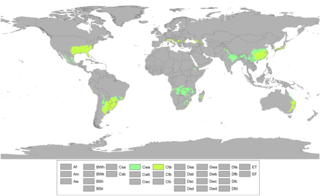
A humid subtropical climate is a zone of climate characterized by hot and humid summers, and cool to mild winters. These climates normally lie on the southeast side of all continents, generally between latitudes 25° and 40° and are located poleward from adjacent tropical climates. It is also known as warm temperate climate in some climate classifications.

Fairfax Harrison was an American lawyer, businessman, and writer. The son of the secretary to Confederate President Jefferson Davis, Harrison studied law at Yale University and Columbia University before becoming a lawyer for the Southern Railway Company in 1896. By 1906 he was Southern's vice-president of finance, and in 1907 he helped secure funding to keep the company solvent. In 1913 he was elected president of Southern, where he instituted a number of reforms in the way the company operated.
Mark E. Davis is the Warren and Katherine Schlinger Professor of Chemical Engineering at the California Institute of Technology. He is a member of the City of Hope National Medical Center. He earned his B.S., M.S., and Ph.D. in Chemical Engineering all from the University of Kentucky. His lab focuses on the synthesis of materials for catalysis and biocompatible materials for drug delivery.

John Warren Davis was an American educator, college administrator, and civil rights leader. He was the fifth and longest-serving president of West Virginia State University in Institute, West Virginia, a position he held from 1919 to 1953. Born in Milledgeville, Georgia, Davis relocated to Atlanta in 1903 to attend high school at Atlanta Baptist College. He worked his way through high school and college at Morehouse and graduated with a Bachelor of Arts degree in 1911. At Morehouse, Davis formed associations with John Hope, Mordecai Wyatt Johnson, Samuel Archer, Benjamin Griffith Brawley, Booker T. Washington, and W. E. B. Du Bois. He completed graduate studies in chemistry and physics at the University of Chicago from 1911 to 1913 and served on the faculty of Morehouse as the registrar and as a professor in chemistry and physics. While in Atlanta, Davis helped to found one of the city's first chapters of the National Association for the Advancement of Colored People (NAACP).
References
- 1 2 Faculty profile, University of Virginia, accessed 2012-09-28.
- ↑ Dean, Cornelia (June 23, 1992), "Scientists Put a Ruler on Northeasters", The New York Times .
- ↑ Spencer, Peter (December 1, 2000), "Warmer Winters" , Consumers' Research Magazine.
- ↑ "Warming won't devastate, researchers say", The Philadelphia Inquirer, June 14, 2004.